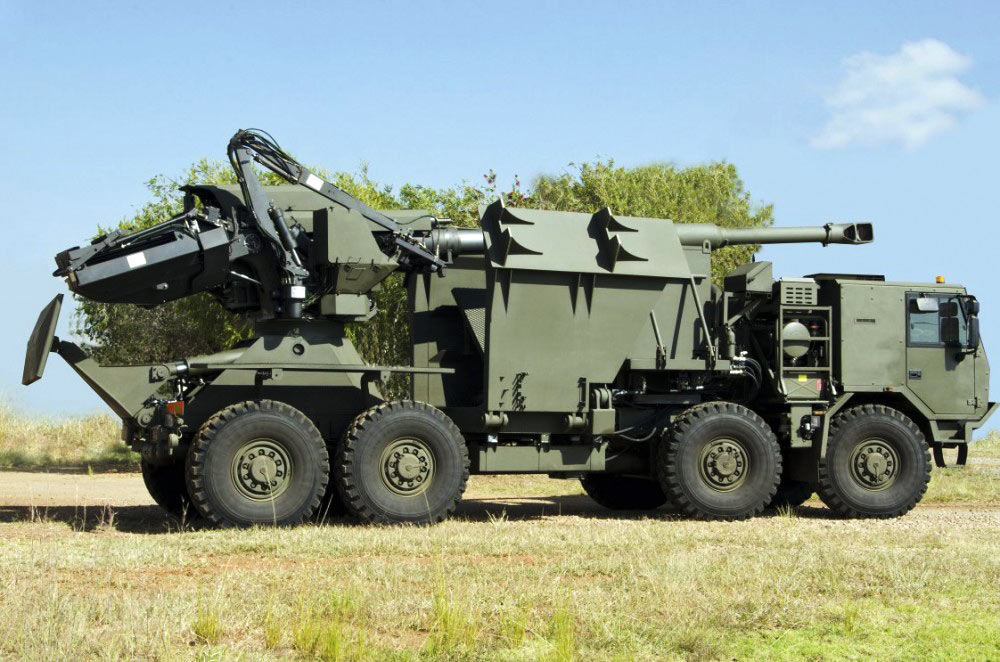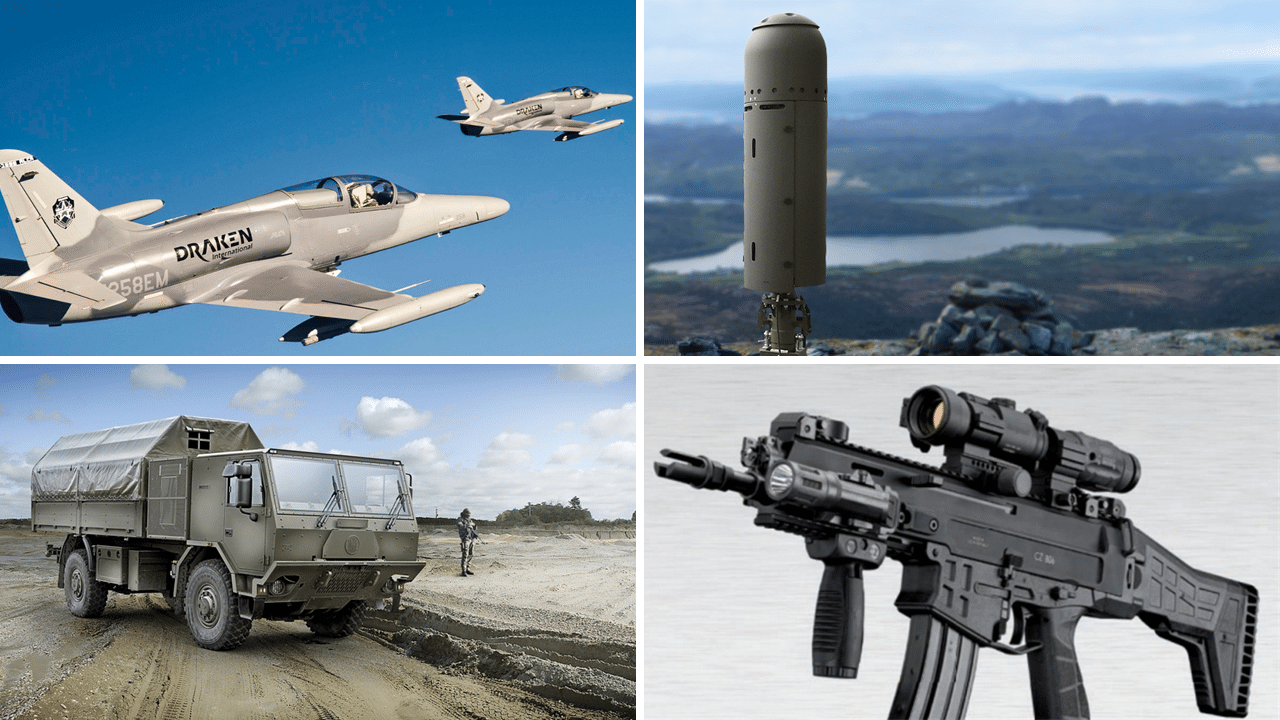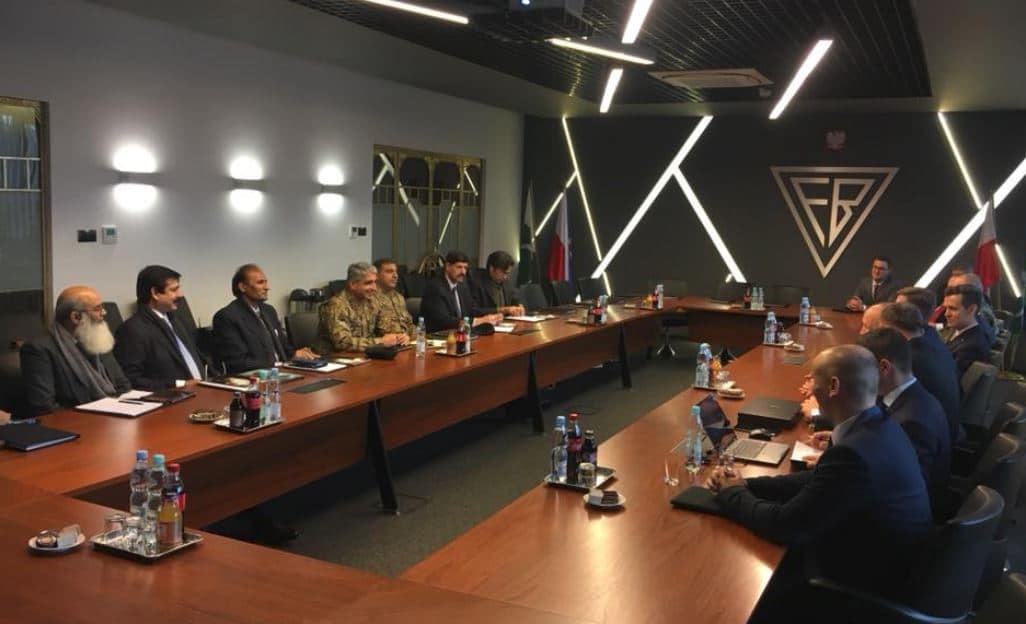2614Views 14Comments

IDEAS 2016 Preview: Denel Land Systems will showcase the T5-52 howitzer
In the lead-up to the International Defence Exhibition and Seminar (IDEAS), which will begin in Karachi on 22 November, Quwa will overview some of the scheduled events.
Denel Land Systems, a division of Denel Group, will showcase its T5-52 truck-mounted self-propelled howitzer at the International Defence Exhibition and Seminar (IDEAS), which will take place starting 22 November in Karachi, Pakistan.
The Denel T5-52 is a 155 mm/52 calibre gun mounted to a Tatra T815-7 8×8 truck. According to IHS Jane’s, the T5-52 can begin firing within one minute of the truck stopping. Its maximum range is 30 km with standard shells, 42.5 km with base bleed shells, and 55 km with velocity enhanced projectiles. The full system weighs 38 tons and can reach a top speed of 85 km/h. In general, a truck-mounted artillery system can be used in rapid-deployment and asymmetrical combat scenarios (e.g. counterinsurgency).
The South African defence news publication defenceWeb identified Pakistan as a possible client of the T5-52 in August. The Pakistan Army has been in the process of modernizing its artillery assets over the past decade. In 2008, the Army procured two SH-1 truck-mounted 155 mm howitzers from China for testing, it is not clear if additional units had been ordered since.
Denel’s T5-52 presentation at IDEAS could mark the start of a concerted marketing and sales campaign for the system (and potentially its sibling systems) in Pakistan. If successful, it would mark the first open big-ticket sale between the South African defence giant and the Pakistani armed forces.
Denel Group will also be exhibiting hardware and services from its other divisions, e.g. Denel Dynamics, at IDEAS. The Pakistan Air Force and Pakistan Navy had expressed interest in the A-Darter within-visual-range air-to-air missile and Umkhonto surface-to-air missile, respectively.
Edit: Added maximum range figures for base bleed and velocity enhanced projectiles. Thank you Matthys Jacobs.



14 Comments
by Matthys Jacobs
Just a correction, That standard range is 30 km’s and the maximum range of fire is 42.5 km with base bleed and 55 km with velocity enhanced projectiles or VLAP.
It would be irony if Pakistan chose the system that was preferred by India but excluded due to a false corruption charge used to reverse engineer the Denel NTW-20 anti-material rifle.
The Denel T5-52 coupled with the modern towed G5-2000 and perhaps the towed lightweight 105mm G7 and a possible truck of IFV mounted 105mm G7 turret would give Pakistan a qualitative edge over its neighbours in terms of range and accuracy.
It could also open up further partnerships with South Africa and Denel.
Both countries have fledgling defence industries that have synergies between them, both countries cannot compete with the likes of China, India, US, Russia etc and partnering together would create economies of scale.
Radar, Electronic Warfare, Missile/Munitions, Artillery, Armoured Vehicles would all be good avenues to combine resources.
by Bilal Khan - Quwa
I don’t recall Denel doing anything of this sort (e.g. public demonstrations) in Pakistan before, and having two seminars – one for the full company and one for the T5-52 – as well as an exhibit bodes well in terms of the company’s desire to build a presence.
I think it will do well in terms of displacing Western vendors (much like Turkey has done in the subsystems field in Pakistan). China will always be a tough fight, but not every thing coming out of China is a sure lock – we are, after all, taking a look at a T5-52 four years after testing the Chinese SH-1.
There are a lot of areas of collaboration where the two countries can mutually benefit in terms of scale and bringing proposals or slowly developing projects into relevance.
MRAPs and light armoured high mobility vehicles could be another area of cooperation.
The Pakistani Army, Frontier Corps, Rangers, etc, have a recurring need for such vehicles and in numbers. We also have several local private sector actors looking to tap into this base with the support of overseas partners (e.g. Metal Engineering Works producing the Spanish URO VAMTAC under license).
There is an entry point here for Denel Land Systems and Paramount Group, and I would reckon that even in a contested field, the Pakistani market in this specific area will be quite large (we’re 10+ years into fighting an insurgency along the Afghan border).
by Matthys Jacobs
I fully agree with you that there is a wide area of possible collaboration between the two countries which politicians are failing to notice.
South Africa was a leader in HMD and is still a heavy hitter when compared to say China and Russia. Both BAE and SAAB have used South African technology in their current configurations.
With some additional funding and a anchor user South Africa is well within their capabilities to develop a new generation HMD suite.
MRAPS and Light Armoured vehicles are also a niche within South Africa however because the South African Defence Department and Armed Forces have not put in a significant order it has meant certain solutions are sitting in limbo such as a rapidly deployed light armoured vehicle called the MC-90 which was envisioned to replace the MC-90 weighing at 7 tonnes and being transportable via a C-130 aircraft or being carried by a heavy lift helicopter.
If Pakistan and South Africa chose joint development and joint orders it would create economies of scale to reduce the costs for both participants. Pakistan would have been given a boost in technology and know how and South Africa could retain its inherent industrial advantage.
Pakistan lives in a complex region compared to South Africa so obviously its requirements differs greatly from a at peace Southern African region therefore using operations experience from Pakistan against potential aggressors whether state or non state would allow both countries to find a technical compliment.
Personally I’ve never dealt with Pakistani businessmen because the business environment in Pakistan seems difficult to penetrate and is not at the same sort of financial maturity as say India (not to say India is better, I actually struggle with Indian businessmen and find their ways of doing business concerning).
India is a competitor to South Africa. India has aligned itself with the US, Russia and India and development partners. There’s no way Pakistan or South Africa could compete against that sort of economies of scale of development partners but together it could create a base to compete against those countries in frontier markets.
Going after business in Sri Lanka, Bangladesh, Malaysia, Indonesia within the region would bode well for both countries.
by amar
https://uploads.disquscdn.com/images/b627f0a985ce24175a4397ebbbd1e6076a6605c6453f8c848e461670913423c0.jpg https://uploads.disquscdn.com/images/bbee3a2ef4f69ae11c297fe6105dc7d837c210a5efdbf14c845895250cef2b74.jpg
by Matthys Jacobs
How’s the testing proceeding?
Any thumbs up from Pakistani officials?
by amar
@disqus_Zvpg7rbPyV:disqus
This is DRDO’s ATAGS-155mm/52cal gun system under designer trials. It will be put to user trials very soon. This system has some very advanced features.
by Matthys Jacobs
I wonder if DRDO used any input from its testing of the Denel G5 and T5.
by amar
Hi @Matthys Jacobs
The testing of Denel 155mm/52cal gun was carried out by TATA –which is a pvt entity separate from DRDO. DRDO had no say or supervision over the technical aspects of the gun or the trials. DRDO’s ATAGS has been designed by pune based ARDE in collaboration with a lot of indian pvt companies particularly Bharat Forge and L&T. This is un-unprecedented in the sense pvt players took active part in the design phase itself and hence the gun was ready for trials in just 3-4 years!
by Matthys Jacobs
That’s quite ironic given TATA partnered with Denel for the T5 offering to India.
DRDO partnered with Denel on the Denel T6 Bhim which was a SP Howitzer mounted on a Tank.
Given that DRDO had OFT reversed engineered one of Denel’s other products the NTW-20 there could potentially have been some use of IP in their development.
India has quite poor IP protection laws compared to say South Africa and the US so it wouldn’t be in the realm of impossibility.
by Matthys Jacobs
I think it’s good though.
Regardless of my views on Denel and South Africa being ex-Denel and being a South African.
India should develop its own platforms. Where they got the IP is another story and is the reality of doing business in India. Denel has always failed to learn on that and has bad management and has poor political support.
by amar
It wasn’t DRDO that reverse engineered your AMR rifle but OFB. DRDO and OFB are two very very separate entities . BHIM unfortunately is a dead project.
by Headstrong
You do know that the Indian govt has done its best over the past two years to mend fences with Denel? And that Denel, in spite of all its public aspirations, just can’t get its act together since Riaz was sacked?
You do know that all the private players in India Denel was talking to have backed off given the huge uncertainty associated with Denel’s future?
Ah, what could have been….? And still can, if only…..
by Matthys Jacobs
Having worked at Denel and having a number of former colleagues and current acquaintances still working there and having dealt with Indian industry delegations I respectfully disagree.
Perhaps it could be compared to deceptive marketing, India’s Government and Business Sector knows full well that South Africa and Denel is a minnow in international markets so cannot afford the same sort of IP protection to say a Boeing, Rafael, Airbus et al, therefore it’s always simpler to extract IP from small companies like Denel in order to reverse engineer IP or use products as a base for local development of an equivalent product. China blatantly does this regardless of the country or company but India only does this with smaller providers.
It’s well known in the industry that Indian companies have rarely honoured NDA agreements when it comes to niche industry.
Of course this is a good tactic for local development but it should not be at the expense of developing countries like South Africa nor Developing companies like Denel.
Having been present at the last South Africa-India Business Forum in July of this year, Private sector is at its wits end with Indian businesses and it is more so South Africa’s corrupt government which has allowed the relationship to be more beneficial on the Indian leg rather than an equitable one.
If one looks at the spare of national corruption in South Africa specifically state capture it is a group of Indian nationals who are involved, one specific family with a huge network of Indian nationals or diaspora.
by Headstrong
Then I must respectfully disagree too, sir. If you were at the Business forum in July, we probably came across each other.
Indian businessmen find South Africa quite impossible to deal with. I mean this in the nicest way possible – but the racial tensions within South Africa have divided your country so much that no one knows just who one is dealing with. The whites have no qualms in washing their hands off the blacks, as if they were a different country altogether. In every such forum, the story is the same. Which is why Indians apart, nobody really wants to have to deal with South Africa.
Sir, I have my theories about the Denel anti-materiel rifles, but suffice to say for now that you (and unfortunately, numerous other South Africans) have failed to grasp the opportunity when it was handed on a platter. DRDO/ OFB etc are dead meat now. The name of the game is private industry, and they were looking at SA very optimistically. I am aware of the excellent possibilities in collabaration – and a number were taken forward too. I’m talking not only niche, such as Dynaflow etc, but also mainstream such as Denel. A few could grab the opportunity such as SAAB Grintek, but in most cases Indian businesses walked away disillusioned. And I’m talking about majors such as L&T, RDL, Tata etc. It appeared there was no will to commit. Ofc they went elsewhere
Re the Guptas. If I’m not wrong, two of the three brothers hold SA passports. They may have Indian relatives, friends, business partners, but they’re South African with South African business. Also in bed with South African politicians and business, I’m told. And absolutely nothing to do with the Indian government. But your statement is so typical. If there is corruption in SA, it must be the Indians (or the blacks, or somebody else… but not ‘us’)
If you find Pakistan to be a better business bet, so be it. I think of what might have been